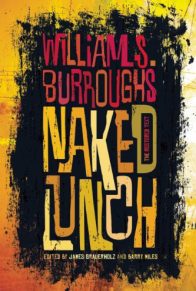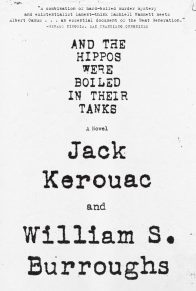The camera is the eye of a cruising vulture flying over an area of scrub, rubble and unfinished buildings on the outskirts of Mexico City.
Five-story building no walls no stairs … squatters have set up makeshift houses … floors are connected by ladders … dogs bark, chickens cackle, a boy on the roof makes a jack-off gesture as the camera sails past.
Close to the ground we see the shadow of our wings, dry cellars choked with thistles, rusty iron rods sprouting like metal plants from cracked concrete, a broken bottle in the sun, shit-stained color comics, an Indian boy against a wall with his knees up eating an orange sprinkled with red pepper.
The camera zooms up past a red-brick tenement studded with balconies where bright pimp shirts flutter purple, yellow, pink, like the banners of a medieval fortress. On these balconies we glimpse flowers, dogs, cats, chickens, a tethered goat, a monkey, an iguana. The vecinos lean over the balconies to exchange gossip, cooking oil, kerosene and sugar. It is an old folklore set played out year after year by substitute extras.
Camera sweeps to the top of the building where two balconies are outlined against the sky. The balconies are not exactly one over the other since the top balcony recedes a little. Here the camera stops … ON SET.
It is a bright windy morning China-blue half-moon in the sky. Joselito, the maricón son of Tía Dolores, has propped up a mirror by the rain barrel and is shaving the long silky black hairs from his chest in the morning wind while he sings
“NO PEGAN A MIO.” (“DON’T HIT ME”)
It is an intolerable sound that sets spoons tinkling in saucers and windowpanes vibrating. The vecinos mutter sullenly.
“Es el puto que canta.” (“It is the queer who sings.”) “The son of Dolores.” She crosses herself.
A young man rolls off his wife despondently.
“No puedo con eso puto cantando.” (“I can’t do it with that queer singing.”)
“The son of Dolores. She has the evil eye.”
In each room the face of Joselito singing “NO PEGAN A MIO’ is projected onto the wall.
Shot shows an old paralyzed man and Joselito’s face inches from his screaming “NO PEGAN A MIO.”
“Remember that he is the son of Dolores.”
“And one of Lola’s “Little Kittens.””
Tía Dolores is an old woman who runs a newspaper-and-tobacco kiosk. Clearly Joselito is her professional son.
On the top balcony is Esperanza just down from the mountains since her husband and all her brothers are in prison for growing opium poppies. She is a massive woman with arms like a wrestler and a permanent bucktoothed snarl. She leans over the balcony wall.
“Puto grosero, tus chingoa de pelos nos soplan en la cocina.
(“Vulgar queer, your fucking hairs are blowing into our food.”)
Shot shows hairs sprinkling soup and dusting an omelet like fine herbs.
The epithet “grosero’ is too much for Joselito. He whirls cutting his chest. He clutches the wound with an expression of pathic dismay like a dying saint in an El Greco painting. He gasps “MAMACITA” and folds to the red tiles of the balcony dripping blood.
This brings Tía Dolores from her lair under the stairs, a rat’s nest of old newspapers and magazines. Her evil eyes rotate in a complex calendar, and these calculations occupy her for many hours each night settled in her nest she puffs and chirps and twitters and writes in notebooks that are stacked around her bed with magazines on astrology ” “Tomorrow my noon eye will be at its full.” ” This table of her power is so precise that she has to know the day hour minute and second to be sure of an ascendant eye and to this end she carries about with her an assortment of clocks, watches and sundials on thongs and chains. She can make her two eyes do different things, one spinning clockwise the other counterclockwise or she can pop one eye out onto her cheek laced with angry red veins while the other sinks back into an enigmatic grey slit. Latterly she has set up a schedule of “ojos dukes’ (‘sweet eyes’) and gained some renown as a healer though Tío Mate says he would rather have ten of her evils than one of her sweets. But he is a bitter old man who lives in the past.
Dolores is a formidable war machine rather like a gun turret, dependent on split-second timing and the reflector disk of her kiosk, she is not well designed for surprise encounters.
Enter the American tourist. He thinks of himself as a good guy but when he looks in the mirror to shave this good guy he has to admit that “well, other people are different from me and I don’t really like them.” This makes him feel guilty toward other people. Tía Dolores hunches her cloak of malice closer and regards him with stony disapproval.
“Buenas d”as se”orita.”
“Desea algo?”
“Sí … Tribune . . Tribune Americano…”
Silently pursing her lips she folds the Herald Tribune and hands it to him. Trying not to watch what the woman is doing with her eyes, he fumbles for change. Suddenly his hand jumps out of the pocket scattering coins on the pavement. He stoops to pick them up.
A child hands him a coin.
“Gracias … Gracias.…
The child looks at him with cold hatred. He stands there with the coins in his hand.
“Es cuanto?”
“Setenta centavos.”
He hands her a peso. She drops it into a drawer and pushes the change at him.
“Gracias … Gracias “”
She stares at him icily. He stumbles away. Halfway down the block he screams out
“I’ll KILL THE OLD BITCH.”
He begins to shadowbox and point pistols. People stop and stare.
Children scream after him.
“Son bitch Merican crazy man.”
A policeman aproaches jerkily.
“Señor oiga …”
“OLD BITCH … OLD BITCH.”
He lashes out wildly in a red haze blood cold on his shirt.
Enter a pregnant woman. She orders the Spanish edition of Life. Looking straight at the woman’s stomach, Dolores’ eyes glaze over and roll back in her head.
“Nacido muerto’ (“Born dead”) whispers Tío Pepe who has sidled up beside the woman.
On “sweet eye” days she changes her kiosk to a flower stall and sits there beaming the sweetest old flower lady of them all.
Enter the American tourist his face bandaged his arm in a sling.
“Ah! the American caballero wishes the Tribune. Today I sell flowers but this paper I have kept for you.”
Her eyes crease in a smile that suffuses her face with gentle light.
“Aquí señor, muchas gracias.”
The paper smells faintly of roses. The coins leap into his hand.
Giving him the change she presses a coin into his palm and folds his fingers over it.
“This will bring you luck señor.”
He walks down the street smiling at children who smile back … “I guess that’s what we come here for … these children … that old flower lady back there
Enter the woman whose male child was born dead. She has come to buy a flower for his grave. Tía Dolores shakes her head sadly.
“Pobrecito.” (“Poor little one.”)
The woman proffers a coin. Tía Dolores holds up her hands.
“No señora ” Es de mío “”
However, her timing schedule necessitates a constant shift of props and character ” ‘my sweet eye wanes with the moon” ” That day the tourist reached his hotel in a state of collapse for a terrible street boy followed him from the kiosk screaming
“Son bitch puto queer, I catching one clap from fucky you asshole.”
Sometimes half her booth is a kiosk and the other half a flower stall and she sits in the middle, her sweet eye on one side and her kiosk eye on the other. She can alternate sweet and evil twenty-four times a second her eyes jumping from one socket to the other.
Confident from her past victories, Tía Dolores waddles out onto the balcony like a fat old bird.
“Pobrecito” … She strokes Joselito’s head gathering her powers.
“Tell your maricón son to shave in the house.”
With a hasty glance at three watches, Dolores turns to face this uncouth peasant woman who dares to challenge her dreaded eye.
“Vieja loca, que haces con tu ojos?” sneers Esperanza.
“Tu te pondr’s ciego como eso’ (“Old crazy one, what are you doing with your eyes? You will blind yourself doing that.”
Dolores gasps out “TÍO PEPE” and sinks to the deck by her stricken son.
And Tío Pepe pops out tying his pants in front with a soggy length of grey rope. Under a travesty of good nature his soul is swept by raw winds of hate and mischance. He reads the newspapers carefully gloating over accidents, disasters and crime he thinks he is causing by his ‘sugesti”nes.” His magic consists in whispering potent phrases from newspapers ” ” there are no survivors ” condemned to death ” fire of unknown origins ” charred bodies ” This he does in crowds where people are distracted or better, much better right into the ear of someone who is sleeping or unconscious from drink. If no one is around and he is sure of his flop he reinforces his ‘sugesti”nes’ by thumping him in the testicles, grinding a knuckle into his eye or clapping cupped hands over his ears.
Here is a man asleep on a park bench. Tío Pepe approaches. He sits down by the man and opens a paper. He leans over reading into the man’s ear, a thick slimy whisper.
“No hay supervivientes’ The man stirs uneasily.
‘muerto en el acto’ The man shakes his head and opens his eyes. He looks suspiciously at Tío Pepe who has both hands on the paper. He stands up and taps his pockets. He walks away.
And there is a youth sleeping in a little park. Tío Pepe drops a coin by the boy’s head. Bending down to pick up the coin he whispers … “un joven muerto’ (“a dead youth.”)
Several times the vecinos shoo him away from a sleeper and he hops away like an old vulture showing his yellow teeth in a desperate grin. Now he has picked up the spoor of drunken vomit and there is the doll sprawled against a wall, his pants streaked with urine. Bending down as if to help the man up, Tío Pepe whispers in both ears again and again ” “accidente horrible” ” He stands up and shrieks in a high falsetto voice ” “EMASCULADO EMASCULADO EMASCULADO’ and kicks the man three times gently in the groin.
He finds an old drunken woman sleeping in a pile of rags and claps a hand over her mouth and nose whispering ” “vieja borracha asfixiado.” (“old drunken woman asphyxiated.”)
Another drunk is sleeping in dangerous proximity to a brush fire.
Tío Pepe drops a burning cigarette butt into the man’s outstretched hand squatting down on his haunches he whispers slimily … “cuerpo carbonizado … cuerpo carbonizado … cuerpo carbonizado.” … He throws back his head and sings to the dry brush, the thistles the wind ” “cuerpo carbonizado ” cuerpo carbonizado ” cuerpo carbonizado “”
He looks up at Esperanza with a horrible smile.
“Ah! the country cousin rises early.” While he croons a little tune.
‘resbalando sobre un pedazo de jab”n Slipping on a piece of soap se precipito de un balc”n.” fell over a balcony.
Esperanza swings her great arm in a contemptuous arc and wraps a wet towel around the balcony wall spattering Tío Pepe, Dolores and Joselito with dirty water. Sneering over her shoulder she turns to go inside.
The beaten team on the lower balcony lick their wounds and plot revenge.
“If I can but get her in front of my kiosk at 9:23 next Thursday “”
“If I could find her borracho “”
“And I will have her gunned down by pistoleros’”
This boast of Joselito is predicated on his peculiar relationship with Lola La Chata. Lola La Chata is a solid 300 pounds cut from the same mountain rock as Esperanza. She sells heroin to pimps and thieves and whores and keeps the papers between her massive dugs. Joselito had a junky boy friend who took him to meet Lola.
Joselito danced flamenco screeching like a peacock. Lola laughed and adopted him as one of her “Little Kittens.” In a solemn ceremony he had suckled at her great purple dug bitter with heroin. It was not uncommon for Lola to service customers with two “Little Kittens’ sucking at her breasts.
As Esperanza turns to go inside six pimpish young men burst through the door in a reek of brilliantine and lean over the balcony screaming insults at Joselito.
This brings reinforcements to the faltering lower balcony. Tío Mate stalks out followed by his adolescent Ka El Mono.
Tío Mate is an old assassin with twelve deer on his gun. A thin ghostly old man with eyes the color of a faded grey flannel shirt. He wears a black suit and a black Stetson. Under the coat a single action Smith & Wesson tip up forty-four with a seven-inch barrel is strapped to his lean flank. Tío Mate wants to put another deer on his gun before he dies.
The expression a ‘deer” (un ‘venado’) derives from the mountainous districts of northern Mexico where the body is usually brought into the police post draped over a horse like a deer.
A young district attorney just up from the capital. Tío Mate has dropped by to give him a lesson in folklore.
Tío Mate (rolling a cigarette): “I’m going to send you a deer, se”or abogado.”
The D.A. (he thinks “well now that’s nice of him”): “Well thank you very much, if it isn’t too much trouble “”
Tío Mate (lighting the cigarette and blowing out smoke): “No trouble at all se”or abogado. It is my pleasure.”
Tío Mate blows smoke from the muzzle of his forty-four and smiles.
Man is brought in draped over a saddle. The horse is led by a woodenfaced Indian cop. The D.A. comes out. The cop jerks his head back … “un venado.”
Tío Mate had been the family pistolero of rich landowners in northern Mexico. The family was ruined by expropriations when they backed the wrong presidential candidate and Tío Mate came to live with relatives in the capital. His room is a bare, white cell, a cot, a trunk, a little wooden case in which he keeps his charts, sextant and compass. Every night he cleans and oils his forty-four. It is a beautiful custom-made gun given to him by the patr”n for killing ‘my unfortunate brother the General.” It is nickel-plated and there are hunting scenes engraved on the cylinder and barrel. The handles are of white porcelain with two blue deer heads. There is nothing for Tío Mate to do except oil his gun and wait. The gun glints in his eyes a remote mineral calm. He sits for hours on the balcony with his charts and instruments spread out on a green felt card table. Only his eyes move as he traces vultures in the sky. Occasionally he draws a line on the chart or writes down numbers in a logbook. Every Independence Day the vecinos assemble to watch Tío Mate blast a vulture from the sky with his forty-four. Tío Mate consults his charts and picks a vulture. His head moves very slightly from side to side eyes on the distant target he draws aims and fires: a vulture trailing black feathers down the sky. So precise are Tío Mate’s calculations that one feather drifts down on to the balcony. This feather is brought to Tío Mate by El Mono his Feather Bearer. Tío Mate puts the feather in his hat band. There are fifteen black years in his band.
El Mono has been Tío Mate’s Feather Bearer for five years. He sits for hours on the balcony until their faces fuse. He has his own little charts and compass. He is learning to shoot a vulture from the sky. A thin agile boy of thirteen he climbs all over the building spying on the vecinos. He wears a little blue skullcap and when he takes it off the vecinos hurry to drop a coin in it. Otherwise he will act out a recent impotence, a difficult bowel movement, a cunt-licking with such precise mimicry that anyone can identify the party involved.
El Mono picks out a pimp with his eyes. He makes a motion of greasing a candle. The pimp licks his lips speechless with horror his eyes wild. Now El Mono is shoving the candle in and out his ass teeth bare eyes rolling he gasps out: ‘sangre de Cristo’” The pimp impaled there for all to see. Joselito leaps up and stomps out a triumphant fandango. Awed by Tío Mate and fearful of a recent impotence, a difficult bowel movement, a cunt-licking, the pimps fall back in confusion.
Tío Paco now mans the upper balcony with his comrade in arms Fern”ndez the drug clerk. Tío Paco has been a waiter for forty years. Very poor, very proud, contemptuous of tips, he cares only for the game. He brings the wrong order and blames the client, he flicks the nastiest towel, he shoves a tip back saying “The house pays us.” He screams after a client “Le service n”est-ce pas compris.” He has studied with Pullman George and learned the art of jiggling arms across the room:
hot coffee in a quiet American crotch.
And woe to a waiter who crosses him:
tray flies into the air. Rich well-dressed clients dodge cups and glasses, bottle of Fundador broken on the floor.
Fern”ndez hates adolescents, pop stars, beatniks, tourists, queers, criminals, tramps, whores and drug addicts. Tío Paco hates their type too.
Fern”ndez likes policemen, priests, army officers, rich people of good repute. Tío Paco likes them too. He serves them quickly and well. But their lives must be above reproach.
A newspaper scandal can mean long waits for service.
The client becomes impatient. He makes an angry gesture. A soda siphon crashes to the floor.
What they both love most of all is to inflict humiliation on a member of the hated classes, and to give information to the police.
Fernández throws a morphine script back across the counter.
“No prestamos servicio a los viciosos.” (“We do not serve dope fiends.”)
Tío Paco ignores a pop star and his common-law wife until the cold sour message seeps into their souls:
“We don’t want your type in here.”
Fernández holds a prescription in his hand. He is a plump man in his late thirties. Behind dark glasses his eyes are yellow and liverish. His low urgent voice on the phone.
“Receta narcótica falsificado.” (“A narcotic prescription forged.”)
“Your prescription will be ready in a minute señor.”
Tío Paco stops to wipe a table and whispers … “marijuana in a suitcase … table by the door” … The cop pats his hand.
Neither Tío Paco nor Fernández will accept any reward for services rendered to their good friends the police.
When they first came to live on the top floor five years ago Tío Mate saw them once in the hall.
“Copper-loving bastards,” he said in his calm final voice.
He did not have occasion to look at them again. Anyone Tío Mate doesn’t like soon learns to stay out of Tío Mate’s space.
Fern”ndez steps to the wall and his wife appears at his side. Her eyes are yellow her teeth are gold. Now his daughter appears. She has a mustache and hairy legs. Fern”ndez looks down from a family portrait.
“Criminales. Maricónes. Vagabundos. I will denounce you to the police.”
Tío Paco gathers all the bitter old men in a blast of sour joyless hate. Joselito stops dancing and droops like a wilted flower. Tío Pepe and Dolores are lesser demons. They shrink back furtive and timorous as dawn rats. Tío Mate looks at a distant point beyond the old waiter tracing vultures in the sky. El Mono stands blank and cold. He will not imitate Fern”ndez and Tío Paco.
And now Tía María, retired fat lady from a traveling carnival, comes out onto the lower balcony supporting her vast weight on two canes. Tía Mar”a eats candy and reads love stories all day and gives card readings the cards sticky and smudged with chocolate. She secretes a heavy sweetness. Sad and implacable it flows out of her like a foam runway. The vecinos fear her sweetness which they regard fatalistically as a natural hazard like earthquakes and volcanoes. “The Sugar of Mary” they call it. It could get loose one day and turn the city into a cake.
She looks up at Fernández and her sad brown eyes pelt him with chocolates. Tío Paco tries desperately to outflank her but she sprays him with maraschino cherries from her dugs and coats him in pink icing. Tío Paco is the little man on a wedding cake all made out of candy. She will eat him later.
Now Tío Gordo, the blind lottery-ticket seller, rolls his immense bulk out onto the upper balcony, his wheel chair a chariot, his snarling black dog at his side. The dog smells all the money Tío Gordo takes. A torn note brings an ominous growl, a counterfeit and it will break the man’s arm in its powerful jaws, brace its legs and hold him for the police. The dog leaps to the balcony wall and hooks its paws over barking, snarling, bristling, eyes phosphorescent. Tía Mar”a gasps and the sugar runs out of her. She is terrified of “rage dogs’ as she calls them. The dog seems ready to leap down onto the lower balcony. Tío Mate plots the trajectory its body would take. He will kill it in the air.
Tío Pepe throws back his head and howls:
“Perro attropellado para un camión.” (“dog run over by a truck.”)
The dog drags its broken hindquarters in a dusty noon street.
The dog slinks whimpering to Tío Gordo.
González the Agente wakes up muttering “Chingoa” the fumes of Mescal burning in his brain. Buttoning on his police tunic and forty-five he pushes roughly to the wall of the upper balcony.
González is a broken dishonored man. All the vecinos know he has much fear of Tío Mate and crosses the street to avoid him. El Mono has acted out both parts.
González looks down and there is Tío Mate waiting. The hairs stand up straight on Gonz”lez’s head.
“CHINGOA.”
He snatches out his forty-five and fires twice. The bullets whistle past Tío Mate’s head. Tío Mate smiles. In one smooth movement he draws aims and fires. The heavy slug catches Gonz”lez in his open mouth ranging up through the roof blows a large tuft of erect hairs out the back of Gonz”lez’s head. Gonz”lez folds across the balcony wall. The hairs go limp and hang down from his head. The balcony wall begins to sway like a horse. His forty-five drops to the lower balcony and goes off.
Shot breaks the camera. A frozen still of the two balconies tilted down at a forty-five-degree angle. Gonz”lez still draped over the wall sliding forward, the wheel chair halfway down the upper balcony, the dog slipping down on braced legs, the vecinos trying to climb up and slipping down.
“GIVE ME THE SIXTEEN.”
The cameraman shoots wildly … pimps scream by teeth bare eyes rolling, Esperanza sneers down at the Mexican earth, the fat lady drops straight down her pink skirts billowing up around her, Tía Dolores sails down her eyes winking sweet and evil like a doll, dog falls across a gleaming empty sky.
The camera dips and whirls and glides tracing vultures higher and higher spiraling up.
Last take: Against the icy blackness of space ghost faces of Tío Mate and El Mono. Dim jerky faraway stars splash the cheek bones with silver ash. Tío Mate smiles.













